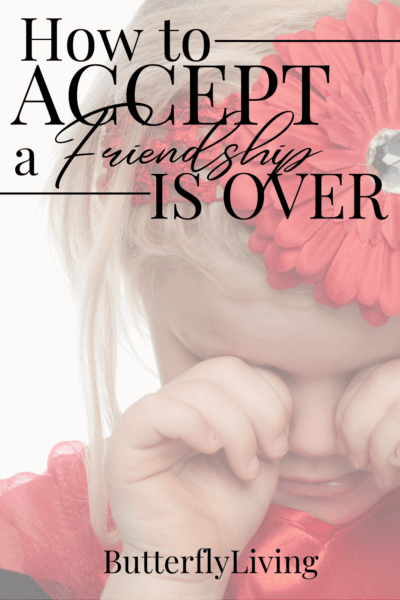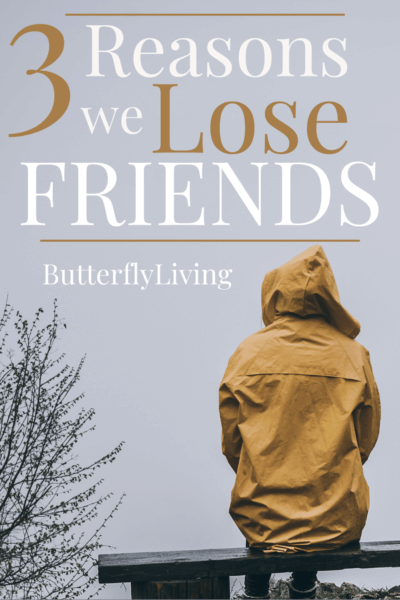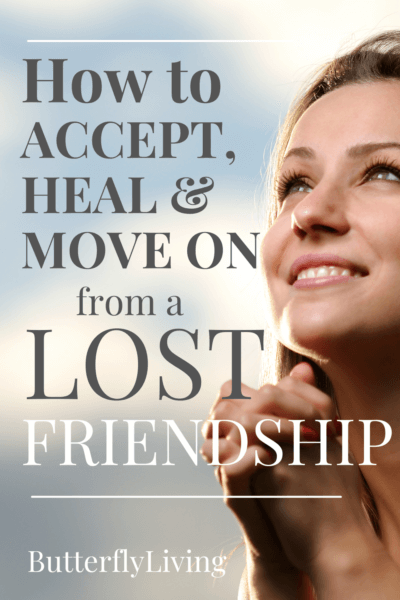When You Lose a Friend: 5 Helpful Ways to Accept, Heal and Move On

When you lose a friend it feels unnatural and painful. So, why do we have to lose friends?
I wish I didn’t have to answer that question and instead could say, “you don’t have to lose friends, ever”. But that is not the way it is, everyone has lost or will lose a friend.
Despite the uncomfortable nature of the topic, when you lose a friend, it is helpful to reflect on friendship loss to heal and find hope.
My husband turned to me recently and said, “you realize most people are only in our life for a season?” I wanted to shout, no, that’s not right! But as I’ve pondered his deep statement, I realize it is true.
We experience many types of friendships but most are temporary. I dislike writing that statement because it sounds sad and a little pessimistic.
But if we remain friends with everyone we meet, we would not have the time or emotional resources to be good friends to anyone. Also, we would not have to explore why do we have to lose friends, because everyone would be our friend! But that is not reality.
Let’s take a deep breath and agree we all lose friends. It doesn’t seem as tragic when viewed from the perspective that we all share the experience at one time or another.
When we lose a friend, instead of denying that friendship loss happens, we can dig into how to grow and be better to the friends who are in our lives today.
 How to Accept that a Friendship is Over
How to Accept that a Friendship is Over
None of us were born knowing how to accept that a friendship is over. It is hard to let go of a good friend because we want to hold onto people we love.
Often even unhealthy friends are hard to release because friendships link our lives together.
It is uncomfortable to let go of people with whom we enjoy sharing life experiences, but acceptance is an important first step to healing.
Years ago, I met a friend at my job. We spent time working together and then extended our connection by hanging out after work. We eventually became close friends.
I cherished our time together but eventually, we both switched jobs and lost touch. Nothing happened and we still occasionally see each other, but I had to accept that this friendship was over.
The joy and fulfillment we find in friendship carries the risk that it will only last for a season.
Chad Bird beautifully summarizes friendship:
“As important as they are for mutual conversation, encouragement, and consolation, on a deeper level friends keep us rooted in a genuinely human life—that is, a life in which we live outside ourselves, gladly caught up in the web of another’s life, where we can love and serve them in moments of self-forgetfulness.”
I love this description of friendship! When I am gathered with good friends who love and accept me just as I am, it is like swimming in self-forgetfulness—free and happy.
Because of the power of human connection, it is not easy to accept that a friendship is over. But if we mute the signs that a friendship is lost, whether permanently or for a season, we limit our ability to grow and meet other friends.
The best way to soften the blow of a lost friendship is to be secure in our identity in Christ. Friends complement our relationship with God; they do not define or dictate who we are and where we belong.
We may never understand why we lose friends, but we can turn to Jesus who walks beside us through our loss.
When we view life from an eternal perspective, it cushions the discouragement and pain that follows the loss of a friend and helps us walk through grief to acceptance.
When You Lose a Friend
When you lose a friend, it hurts and can be painful for a long time.
As a teenager when I lost a friend, I tried convincing myself that I was fine. I had moved on. I wanted my lost friend to know she had been replaced with someone else who may be even better.
‘Look at me smiling and laughing and taking pictures with my new friend.’
But I learned that attitude is not authentic or real; it’s an illusion created to mask hurt feelings associated with losing a friend.
Now when I lose a friend, I grieve quietly and pray for God to soothe my sadness, disappointment, and emptiness. I seek advice and comfort from a close friend or my husband. Eventually, I trust God to reveal a new assignment to replace my feelings of loss.
When we lose something we value, we have to grieve before we can move on. When you lose a friend it is important to give yourself time to grieve, adjust and restart.
 Why Do We Have to Lose Friends?
Why Do We Have to Lose Friends?
My son had a silky blue blanket that he loved to carry around as a toddler. The blanket brought him comfort and helped him feel secure.
As he got older the blanket began to fray and slowly fall apart. It slowly lost significance in his young life until one day he set it down for good.
Sometimes when you lose a friend it is similar to my son’s blanket. Friends provide comfort and security but at times lose significance in our life and it is time to set them down and move on.
There are many things we have to let go of, but people are the toughest. When you lose a friend, it just doesn’t feel right.
At times it feels impossible to move on. But moving is how we find the path to restore our spirit and reclaim our joy.
When you lose a friend, you don’t walk away as the same person, but you can walk away wiser and stronger on the other side of pain.
After our family moved to another state, I called a friend to let her know we had arrived and were settled. This was before texting, so I left her a couple of voice messages. When I did not hear back from her, I was puzzled by her silence.
One day a friend from our circle called to catch up. She casually mentioned that our mutual friend (who I had tried to reach) just wanted to be my “Christmas card friend”.
Ouch, just like that I lost a friend. When you lose a friend it can be unexpected and not connected to a conflict.
In this case, my friend decided the distance was too great to continue the relationship. As sad as I was to lose a friend, it helped me realize you can’t always control losing a friend. People walk away or establish boundaries for reasons we may never know or understand.
After overcoming my disappointment, I realized how important it is to be content and value friendships that are part of our life today.
Three Reasons Why We Lose Friends
When you lose a friend there are many reasons, but three causes seem to strike often.
-
When you lose a friend due to a change in circumstances
Many friendships are birthed and maintained through a mutual connection. When that connection or circumstance changes, we disconnect; moving, divorce, job changes, and having children are examples.
When you lose a friend, it takes time to understand what caused the friendship to end, but through reflection, we realize we lacked a connection to keep the relationship alive.
-
When you lose a friend due to growing apart
As we go through our journey in life, we sometimes take separate paths from friends. Personal growth leads to self-awareness, change, and growing apart from some friends. This is a difficult adjustment especially for friends we have known a long time. It is possible to remain friends, even if we go in different directions.
But when we lose a friend due to personal growth, sometimes the divide is too wide to stay connected and we grow apart.
-
When you lose a friend due to conflict
When we lose a friend through conflict, it causes the most heartache. Regardless of who caused or initiated the conflict, a broken bridge is painful. Mistakes, resentment, decisions, or disconnecting from God can lead to conflict in relationships.
Regardless of the reason, when you lose a friend, it is often unavoidable.
We can’t always control the reason why we lose friends. Circumstances change due to personal or family obligations. As we grow personally and spiritually, we change, and our changes do not always coincide with our friends. And even conflict may not be our responsibility or choice.
“Remember: the quality of a relationship lies in the time you have with that person, not in how the relationship ends. Never judge the quality of a friendship by its ending.”
As we weave through the seasons of life and personal transformation, we cross and uncross paths with many people. It is truly miraculous when we find good friends that stick around for a lifetime.
Good friends are a gift and being grateful for positive relationships helps us nourish and cling to those who are currently part of our story.
Five Tips for When You Lose a Friend
Since losing friends is part of our journey, here are five tips to help you heal and move on when you lose a friend.
1)When you lose a friend, show grace
Grace is unmerited favor and courteous goodwill toward others. When grace is our motivator instead of retaliation, we grow spiritually and set an example for others walking out hurt.
Christ shows us grace every day and this is how we can share His unmerited favor.
“But as you excel in everything—in faith, in speech, in knowledge, in all earnestness, and our love for you—see that you excel in this act of grace also.”
2 Corinthians 8:7 ESV
2) When you lose a friend, embrace peace
Conflict is hard and can drag on indefinitely if we let it. But when we embrace peace, we are set free and can step out confidently and joyfully instead of being plagued by managing negative emotions.
A decision to be a peacemaker starts with you regardless of the choices or decisions of others.
“Do everything possible on your part to live in peace with everybody.”
Romans 12:18 GNT
3)When you lose a friend, accept that the friendship is over or different
It is tempting to hold onto something precious even when it is finished or unavailable.
When we lose a friend if we live in denial and hang on, it stunts our growth and takes our focus off of what God is calling us to do. God’s presence can replace the gap a lost friendship leaves.
“My friends, consider yourselves fortunate when all kinds of trials come your way, for you know that when your faith succeeds in facing such trials, the result is the ability to endure.” James 1:2-3 GNT
4)When you lose a friend, pray for them
It is hard to stay mad and hurt when praying for someone. When you lose a friend and are hurting, it may seem ingenuine, at first, to pray for them. But slowly as we communicate with God and release our pain, He changes our heart
“Pray for those who hurt you. There is nothing wrong with asking the Lord to get them to stay their hand. But praying for them involves asking good for them, seeking the Lord’s presence in their lives, and transformation of their hearts. Loving our enemies is not easy. Nor is it easy to bless them or to pray for them. But this is the way of Jesus.”
“Bless and show kindness to those who curse you, pray for those who mistreat you.” Luke 6:28 AMP
5)When you lose a friend, be open to meeting new friends
It is very common to close ourselves off when someone has hurt us. It feels instinctive and helps us feel safe from future rejection.
But at some point, we should strive to be open to meet a new friend and pave the way for a seasonal or lifetime friend to complement our journey.
When you lose a friend, don’t let fear of being hurt rob you of the joy of great friendships.
“No, dear brothers, I am still not all I should be, but I am bringing all my energies to bear on this one thing: Forgetting the past and looking forward to what lies ahead,” Philippians 3:13
When you lose a friend, time will be a great help in healing. There may be a reason for the loss that you may not understand until some time has passed.
Bible Stories about Friendship
There are many Bible stories about friendship. The Bible features stories of enduring friendship and stories of friends that betrayed each other and ended.
Here are two Bible stories about friendship that give perspective on the complexity and importance of friends.
David and Jonathan’s bond reminds us of the qualities of a good friend.
On the other end of the spectrum, David and Saul’s friendship helps us learn how to endure when you lose a friend. Although their friendship began with admiration, when Saul selected David as his right-hand man, it did not last long.
“From the instant, he saw David, Saul admired and loved him; and David became his bodyguard.”
1 Samuel 16:21 TLB
David and Jonathan’s friendship remained steadfast until Jonathan’s death. But Saul grew apart from David largely due to jealousy and Saul’s own pride and distance from God. Saul’s dislike for David grew to the point that he sought to have him killed.
“In playful frolic the women sang, Saul kills by the thousand, David by the ten thousand! This made Saul angry—very angry. He took it as a personal insult. He said, “They credit David with ‘ten thousand and me with only ‘thousands.’ Before you know it they’ll be giving him the kingdom!” From that moment on, Saul kept his eye on David.”
1 Samuel 18:8 MSG
Unlike David and Jonathan’s strong friendship and lifelong bond, Saul and David were friends for a season.
David had been a good friend to Saul but the friendship was lost because of Saul’s unwillingness to accept David’s call from God and the blessing on his life.
“From the moment Saul started to see David as a potential rival, jealousy consumed the king of Israel, and he began to think of ways to kill the son of Jesse. He twice cast his spear at David while the young man was playing his lyre, yet David remained in the king’s service (1 Sam. 18:6–11).”
Ligonier Ministries, the teachings of RC Sproul.
Paul and Barnabas’ Friendship
Paul and Barnabas’ friendship was cemented by a call from God to travel together as missionaries.
“One day as they were worshiping God—they were also fasting as they waited for guidance—the Holy Spirit spoke: “Take Barnabas and Saul and commission them for the work I have called them to do.” Acts 13:2 MSG
Sometime later Paul and Barnabas had a disagreement. They chose to go their separate ways and still pursue their Godly purpose.
“Their disagreement over this was so sharp that they separated. Barnabas took John Mark with him and sailed for Cyprus.”
Acts 15:39 TLB
In an essay on Acts 15 from Bible.org the ending of Paul and Barnabas’ friendship is explained,
“Luke’s account of the “strong contention” between Paul and Barnabas informs us of several important truths. First, Christians can disagree with each other, and both can be right. Disagreements are not necessarily a sin, and neither are they evidence of some sin on the part of those who differ. Second, disagreements can serve very beneficial purposes.
In the case of the two disagreements of Acts 15, both served to advance the gospel. Paul and Barnabas did have different gifts, different perspectives, and even different callings, but they remained, to the end, one in the faith and in the bonds of love. Their parting was a division, but not a divorce.”
Although David and Saul’s friendship ended differently than Paul and Barnabas’s, both stories help us see how even strong friendships are not immune to ending. When you lose a friend, the Bible is a place to learn, heal and grow from its stories and the Spirit of God.
Friendships take twists and turns. When a friendship ends it is hard, but all relationships help us realize the benefit of friendship. What the Bible says about friends helps us see that some endure and some are lost, but God is always there.
How to Move on From a Friendship
Learning how to move on from a friendship takes time and is different for each loss we experience. When you lose a friend, healing depends on the level of connection, how much we invested in a friendship, and the reason for the loss.
I don’t think understanding how to move on from a broken friendship gets easier, not if we are honest with ourselves.
But I do believe we can experience healing and grow through a friendship loss instead of just rehashing the circumstances or even worse attempting to rescue a dying relationship.
When you lose a friend it can be confusing and frustrating especially when you work hard to be a good friend and still lose friendships. We may not always have control over why a friend is lost, but we do have control over how to move on from a broken friendship.
If we stop loving, we stop living. Ultimately we must trust that God is the healer of a broken heart, and take another chance on friendship. When you lose a friend, the best way to move on is to grow in our faith and prepare ourselves for a new friendship to evolve.








